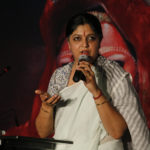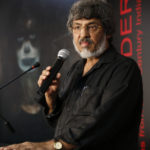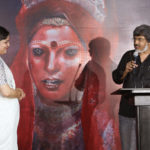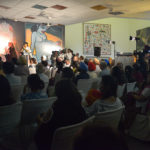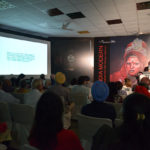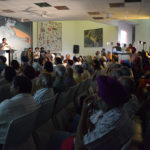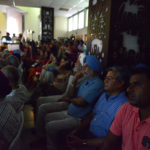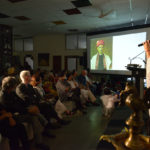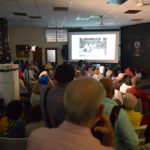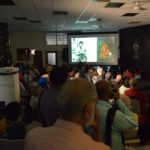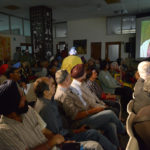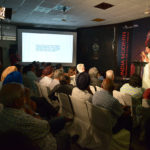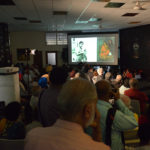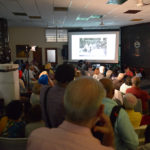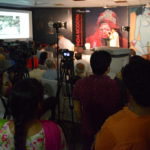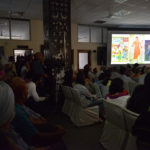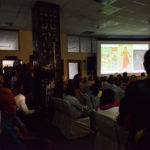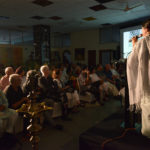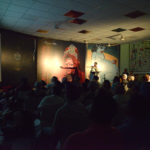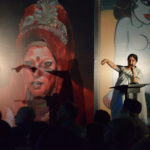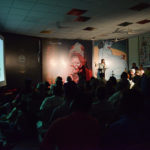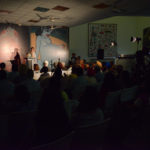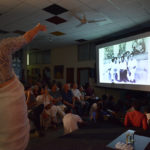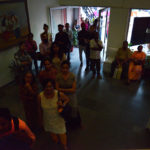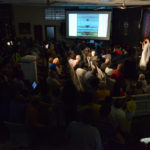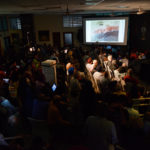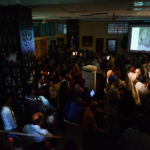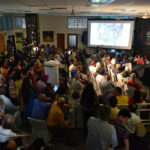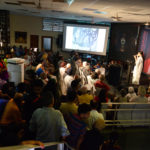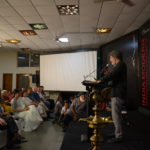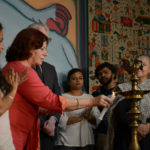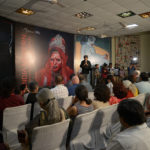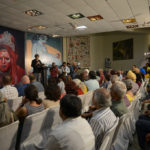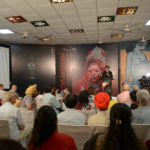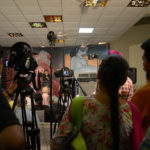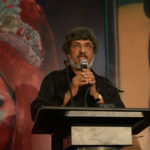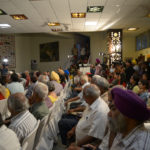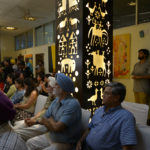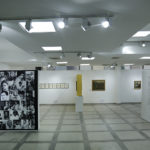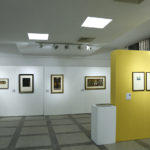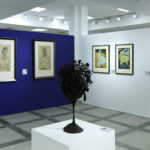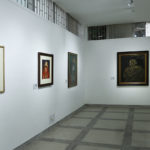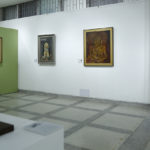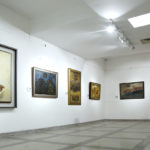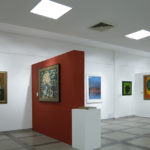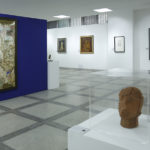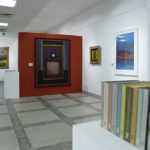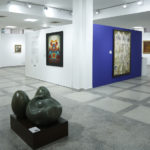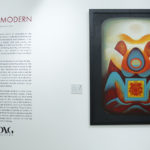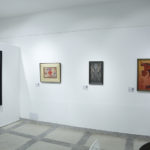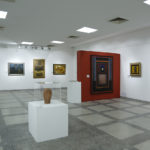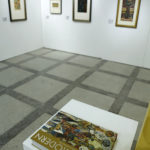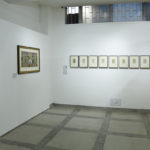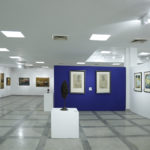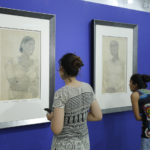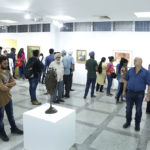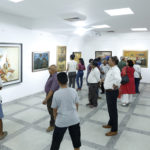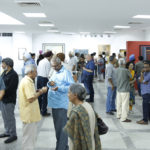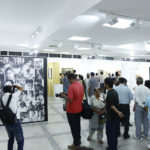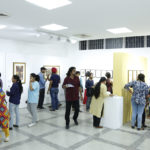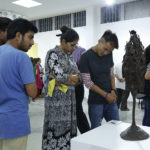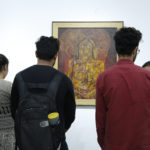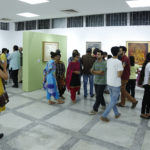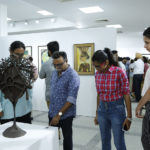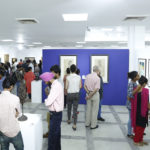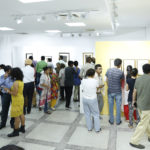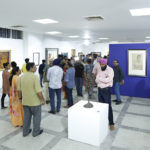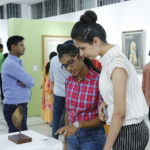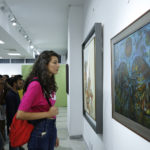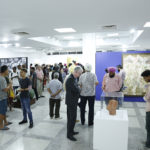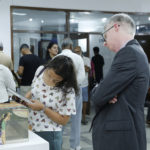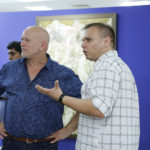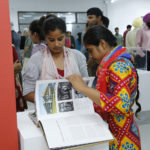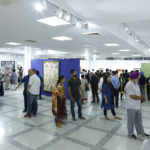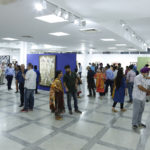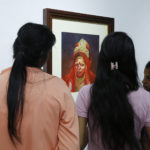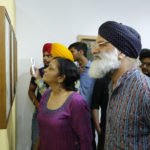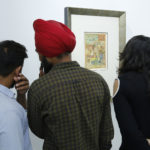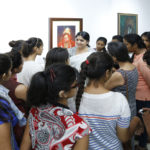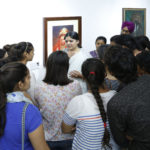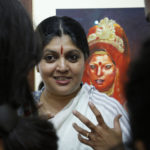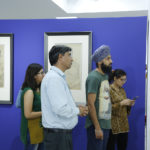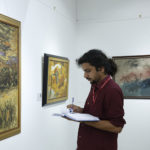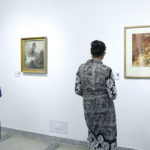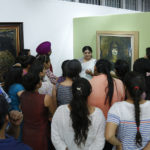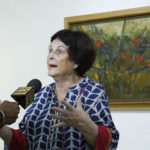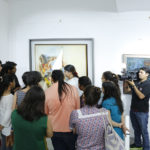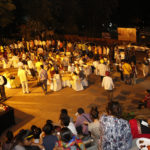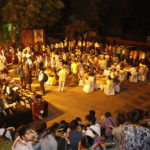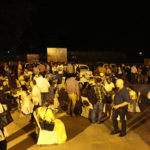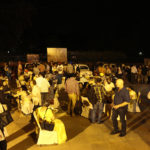Punjab Lalit Kala Akademi
in collaboration with
DAG Modern
organised an exhibition
India Modern
Narratives from 20th Century Indian Art
from Thursday, 14th September to 14th October 2017
at the Galleries of Punjab Lalit Kala Akademi
Punjab Kala Bhawan, Sector 16 B, Chandigarh
and a talk on Indian Modernism by
Yamini Telkar
Showcasing some of the best art works
from its rich collection, DAG Modern, in
collaboration with the Punjab Lalit Kala
Akademi, presented in September this
year a spectacular exhibition, ‘India
Modern: Narratives from 20th Century
Indian Art’, along with Art Walks, Art
Appreciation Workshops, Film Screenings
and Conversation with artists. The exhibition
showcased the expanse of Indian
art practice over the 20th century, covering
periods, styles, themes and artistic
concerns and also presented the diverse
journeys of artists who have defined
Indian modern art.
The exhibition comprising of 57 works
by 41 artists was curated by writer and
art critic Kishore Singh, who is the head
of Publications and Exhibitions at DAG
Modern. This initiative was the first of its
kind in the region, brought to Chandigarh
by artist Diwan Manna, who is also
President of Punjab Lalit Kala Akademi.
The exhibition was a rare opportunity
for art lovers to view significant artworks
of the landmark Indian modernists and
documented the pioneering works of the
various artist collectives and art movements
that have made Indian modern art
into a diverse and exciting stream it is today.
The exhibition gave a chance to viewers to
experience the trajectories, of modern art
practices in India through the showcase of
works from artist collectives like Bombay
Progressives (F. N. Souza, Ram Kumar, M.
- Husain, K. H. Ara, Krishen Khanna, S. H.
Raza) , Group 1890 ( Jyoti Bhatt, Jeram Patel,
Eric Bowen, Ambadas, J. Swaminathan,
Himmat Shah), and other artists, including
Rabindranath Tagore, Nandalal Bose, Sunil
Das, Gopal Ghose, Jamini Roy, Sohan Qadri,
- R. Santosh, Rajendra Dhawan, Avinash
Chandra… among several others. Also on
showcase were sculptures by Dhanraj
Bhagat, Prodosh Das Gupta, Sankho
Chaudhuri. There was a strong emphasis
on women artists who have pioneered
Indian modern art like Sunayani Devi, the
first woman artist from the Tagore household,
Gogi Saroj Pal, Devyani Krishna…
The exhibition featured not just rare and
important works of art by Indian modern
masters, but also covered genres, including
still-life, figurative, narrative, abstract,
tantra, and landscape art.
To bring viewers closer to art and also understand and
appreciate Modern Indian Art, experts from Mumbai
and Delhi, Yamini Telkar, Siddhant Shah, Supriya Consul,
Poonam Baid from DAG and Diwan Manna, President
of the Punjab Lalit Kala Akademi conducted curatorial
art walks as part of the exhibition, ‘India Modern:
Narratives from 20th Century Indian Art’. The sessions
were conducted for students and teachers from
Apeejay College of Fine Arts, Jalandhar, Sainik School,
Jalandhar, Government College for Girls, Sector 11,
Chandigarh, Government College of Art, Chandigarh,
St Kabir’s High School, Chandigarh, Lovely Professional
University, Jalandhar, Chandigarh University, and a
more than 200 other participants from across Punjab
and Chandigarh. The experts gave important insights
into the history of Modern Art, its origins and artists
who engaged themselves in this revolutionary period
in the history of Indian art. Amidst 57 original artworks
by 41 masters of Modern Indian Art, it was a lesson in
the history of Indian Modern Art and rare opportunity
to witness, feel and explore the nuances of visual arts
from close distance. The sessions were replete with
information about the political and social developments
taking place in the world and India and anecdotes about
artists, their personal lives and artistic activities. The
experts spoke about the influences or inspirations of
Indian artists first by the Imperial art practices, then
confluence of the oriental with the western, culminating
with a fusion of local, traditional and folk with the
avant-garde art movements of Europe and beyond.
From lines to textures, shapes to spaces, 25
visually challenged students from the Institute
of Blind, Chandigarh felt and touched the
many contours of art as part of this unique
workshop. With the help of Siddhant Shah,
DAG runs a programme called ABHAS, an initiative
that focuses on providing people with
special needs a sensory experience through
the use of audio and visual aids. Tactile aids
that are created in conjunction with the few
selected art works invite the visitors to touch
and feel. Each student was given an opportunity
to actually feel the specially prepared
tactile art works, simulating the original in
3D for the benefit of visually impaired. For
these students, the visit to the exhibition was
an extraordinary experience, with the specialists
making it a memorable day for them.
Punjab Lalit Kala Akademi and DAG Modern
screened the award-winning documentary film,
‘A Far Afternoon: A Painted Saga by Krishen
Khanna’, directed by Sruti Harihara Subramanian
and produced by Piramal Art Foundation. The
film was screened amidst the original art works
at the exhibition – India Modern, in which 57 art
works by 41 most significant artists of India were
displayed, including a canvas by Krishen Khanna.
The film captured the artist at work along with
insights into his creative process while painting
his large and famous canvas – A Far Afternoon.
Recipient of the 2016 National Award for Best Art /
Cultural Film, the documentary is the filmmaker’s
attempt to capture the artistic process involved
in the creation of the eponymous art work by
veteran artist. Presented in five parts, the documentary
also features art historians and fellow
artists, including Gayatri Sinha, Ranjit Hoskote
and A. Ramachandran, talking about Khanna’s
artistic techniques and his contribution to Indian
modern art.
one of the most defining art collectives in the
history of Indian modern art, was formed in 1947
with the aim to encourage an Indian avant-garde,
engaged at an international level. Founded by F
N Souza, the enfant terrible of Indian art, in 1947,
Progressive Artists’ Group’s members included M
F Husain, S H Raza, H A Gade, K H Ara, S K Bakre.
In 1997, to coincide with a retrospective on the
group completing 50 years at National Gallery of
Modern Art, noted film maker K. Bikram Singh
made a documentary on PAG highlighting its
contribution while also making a case of the
challenging circumstances its members faced for
promoting their respective art. Lack of funding,
few patrons, and even fewer venues to display
their art were some of the problems faced by the
group as mentioned in the documentary. Featuring
in-depth interviews with Husain, Souza, Gade,
Khanna, Bakre, Raza, along with art experts such
as Ebrahim Alkazi, Yashodhara Dalmia, Pranab
Ranjan Ray, among others, the film is relevant in
that it encapsulates the trajectory of the group,
how it began, how it sustained itself before dissolving
in 1956.
Art Appreciation Workshop / by Kishore Singh & Yamini
Telkar in India Modern
Oct 14, 2017
Gallery, Punjab Lalit Kala Akademi, Chandigarh
Workshop for media persons covering art and culture
DAG Modern and Punjab Lalit Kala Akademi organised daylong
art appreciation workshops\seminars comprising five
sessions, as part of the one month exhibition, ‘India Modern:
Narratives from 20th Century Indian Art.’ The sessions,
for media persons covering art and culture, corporate
persons, bureaucrats and art lovers, were held by Kishore
Singh and Yamini Telkar. The aim of the workshops was to
give an understanding of modern art and equip people in
responsible positions, who could help shape the future of
art in the country, with the ability to appreciate art through
a series of sessions and interactions. During the workshop
critical aspects dealing with art were discussed, such as
nudity in art, potential for careers in the field, investing
in art versus collecting art and the efforts involved in
selling an art piece. The session also gave a background
of the origin of Indian art and the role it has played in
Nationalism, its movements, styles and the development of
genres such as portraiture, landscapes, still-life, abstracts
and the importance of spirituality in aesthetic narratives.
Artists represented in the exhibition:
J Sultan Ali, Ambadas, K H Ara, Prabhakar Barwe, Dhanraj Bhagat
Bikash Bhattacharjee, Jyoti Bhatt, Nandalal Bose, Eric Bowen
Avinash Chandra, Sankho Chowdhury, Prodosh Dasgupta
Sunil Das, Sunayani Devi , Rajendra Dhawan, Gopal Ghose
Gogi Saroj Pal, Laxma Goud, Bimal Dasgupta, Himmat Shah
M F Husain, Krishen Khanna, P Khemraj, Devyani Krishna
Ram Kumar, Laxman Pai, Hemen Mazumdar
Rabin Mondal, Jeram Patel , Sohan Qadri , Shyamal Dutta Ray
S H Raza, Jamini Roy, Prosanto Roy, G R Santosh, Bireswar Sen
Paritosh Sen, Satish Sinha, F N Souza, J Swaminathan
Rabindranath Tagore
Images of the Exhibition and the Talk by Yamini telkar:


